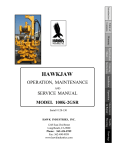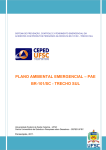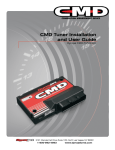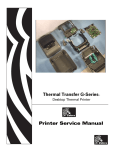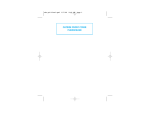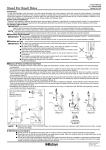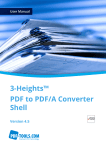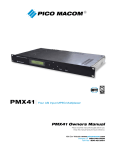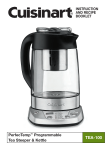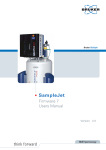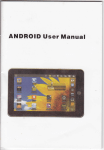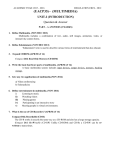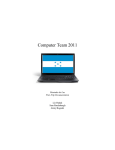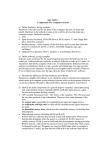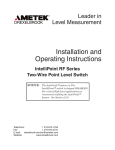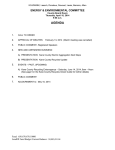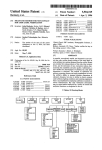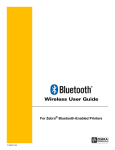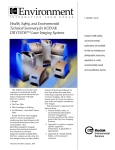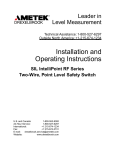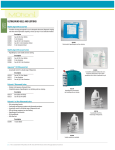Download Packaging and Shipping Inventory to Amazon
Transcript
Quick Reference Guide Packaging and Shipping Inventory to Amazon Packaging and Shipping Inventory to Amazon Quick Reference Guide Packaging and Shipping Inventory to Amazon Contents Labeled Inventory.........................................................................................................................1 Shipment Labels...........................................................................................................................4 Packaging and Prep Requirements...............................................................................................5 Shipping and Routing Requirements.............................................................................................8 Shipment Packing Guidelines.......................................................................................................9 Small Parcel Delivery to Amazon.................................................................................................10 Less than Truckload (LTL) and Full Truckload (FTL) Deliveries to Amazon.....................................11 Delivering Imports to Amazon.....................................................................................................13 Delivering Televisions to Amazon................................................................................................14 Appendix 1: Label Font Specifications.........................................................................................15 Appendix 2: Packaging Products Containing Liquids...................................................................16 Appendix 3: Packaging Sharp Units............................................................................................19 Appendix 4: Packaging Fragile Units...........................................................................................20 Appendix 5: Packaging Plush Units.............................................................................................21 Appendix 6: Packaging Baby Products........................................................................................22 Appendix 7: Packaging Apparel, Fabric, and Textiles...................................................................23 Appendix 8: Packaging Jewelry..................................................................................................24 Appendix 9: Packaging Small Products.......................................................................................25 Appendix 10: Packaging Pellets, Powders, and Granular.............................................................26 Appendix 11: Packaging Plexiglas...............................................................................................27 Appendix 12: Packaging adult products......................................................................................28 Appendix 13: Prep Matrix...........................................................................................................29 Appendix 14: Shipping Matrix: LTL & FTL....................................................................................31 Appendix 14: Shipping Matrix: Small Parcel................................................................................32 Appendix 15: How to Label Products...........................................................................................33 IMPORTANT: Failure to comply with any requirements listed in this document may result in the immediate refusal of inventory at the Amazon fulfillment center, disposal or return of inventory, blocking future shipments to the fulfillment center, charging for any unplanned services performed at the fulfillment center, and/or denial of any credit for missing products. © Copyright 2015, Amazon Services LLC. All Rights Reserved. An Amazon Company Expires December 30, 2015 Quick Reference Guide Packaging and Shipping Inventory to Amazon Labeled Inventory Label Requirements Each Unit you send to Amazon for fulfillment needs a scannable bar code to enable storage at a fulfillment center. Follow these guidelines to ensure prompt and accurate labeling of the Units. Cover any original barcodes • Cover the original manufacturer's barcode (UPC, EAN, ISBN). • No other barcodes can be scannable (exception: serial numbers and barcodes do not need to be covered). • Failure to cover the barcode can cause errors and may result in lost inventory. Label each unit before sending it to Amazon • Make sure the label title matches the corresponding Unit. This ensures that the merchandise can be received, stocked, and sold. • Use only white labels with a removable adhesive. Note: All labels on the products should be removable by the customer. Do Not... • Place faded labels on the Units. • Tape labels to your Units. • Wrap labels around corners or curves on the Unit because this makes the label unscannable. • Leave other barcodes uncovered unless the Unit is stickerless, commingled inventory. • Use QR barcodes on your labels, since they can’t be read by all scanners. Printer Requirements • Use a direct thermal or laser printer. • Each label must be readable and scannable for 24 months. This means that the label must not smudge or fade for at least two years. To ensure that the labels last a long time, use the proper print media for a printer. For example, use laser paper and laser toner with a laser printer. • Use a printer with a print resolution of 300 DPI or greater. • Do not use inkjet printers. Inkjet printers are more susceptible to smearing and blurry images making the labels difficult to read or scan. • Amazon highly recommends using a high-speed model designed specifically to print large numbers of labels. • Amazon fulfillment centers currently use Zebra GX430t model printers with a direct thermal setting. • Amazon highly recommends periodically testing the scannability of the barcodes. Use a tethered scanner to ensure each barcode scans properly. © Copyright 2015, Amazon Services LLC. All Rights Reserved. An Amazon Company 1 Quick Reference Guide Packaging and Shipping Inventory to Amazon Quick Reference Guide Packaging and Shipping Inventory to Amazon Label Specifications Clean the printer Barcode Specifications • We recommend periodically testing, cleaning, or replacing printer heads on a regular basis. This will extend the life of the printer as well as ensuring that labels are printed accurately. Specification Label color Description White • Print a test page to ensure that the printer head is aligned properly. Font • Many labeling errors are caused by dirty printer heads—while a small piece of dust or grime may go unnoticed, this can affect the scannability of the barcodes. Label size See Label Font Specifications in Appendix 1 Use a label with a height by width dimension between 1" x 2" and 2" x 3". For example, you could use a label that is 1" x 3" or 2" x 2", as long as all the required information is included. Removable adhesive Amazon reserves the right to dispose of or liquidate mislabeled Units if the owner is unknown or (when ownership is known) re-label a product at the seller's expense. Label Specifications Item Label Example Label type The label that you place on each unit must include the following information: 1.Barcode, with appropriate quiet zone areas (white space around the barcode) 2.FNSKU: An identifier used by Amazon fulfillment centers to identify each unique product. This is the identifier that is printed on product-level labels and this is how Amazon identifies every Unit you send to us. 3.Title and description 4.Condition (for example, USED): Describes the condition of this Unit. 5.Optional merchant-specified information Note: The merchant-specified information field is reserved for text only. Do not use any additional barcodes. Any additional information you provide may affect the accuracy and speed of inventory tracking. Print Specifications The online inventory management tools support eleven label sizes: 44-up labels • 48.5 mm x 25.4 mm on A4 30-up labels • 1” x 2-5/8” on US Letter 24-up labels • 63.5 mm x 33.9 mm on A4 • 64.6 mm x 33.8 mm on A4 • 66.0 mm x 33.9 mm on A4 • 66.0 mm x 35.0 mm on A4 • 70.0 mm x 36.0 mm on A4 • 70.0 mm x 37.0 mm on A4 27-up labels • 63.5 mm x 29.6 mm on A4 21-up labels • 63.5 mm x 38.1 mm on A4 40-up labels • 52.5 mm x 29.7 mm on A4 2 Expires December 30, 2015 Specification Format Height Narrow barcode element Description Code 128A Greater than 0.25" (or 15% of the barcode length) The specification depends on the printer's resolution. For 300 dpi—3.33 mils For 200 dpi—20 mils 3:1 Wide-to-narrow element ratio Quiet zone (sides) Greater than 0.25" Quiet zone (top Greater than 0.125" and bottom) Note: The barcode should only scan to the FNSKU. No extra characters should be imbedded in the barcode. Additional Information Printing barcodes directly on Units: If you would like to print barcodes directly on Units, use the UCC128 barcode. The UCC128 barcode standards are available on the Internet. Amazon uses the UCC128 barcode (font) to encode the FNSKU or the Shipment ID in the barcode. We don't use any leading or trailing digits (application identifiers or checksum digits.) The full specification is UCC128 code set A (this is the code set that supports alphanumeric data). If you are building the barcode from scratch, you can review the standards or purchase software (there are many barcode applications available for free or at reasonable prices). Receiving Problems and Other Common Errors The following errors receiving problems will slow down the process by which Amazon can receive your inventory and make it available for sale. Amazon may temporarily suspend your shipment creation privileges if the following problems are found: • Barcode label missing: Your unit was not labeled with an Amazon product label. Amazon product labels are required for listings set up for Labeled Inventory, or for any ASINs that do not meet the criteria for Stickerless, Commingled Inventory. If you do not want to label your units yourself, you can sign up for FBA Label Service. • Unit mislabeled: Your unit’s label didn’t match the physical product. Make sure that the label title matches the corresponding unit. • Barcode cannot be scanned: Your product’s label could not be scanned for one or more of the following reasons: -- The barcode was smudged, which could be caused by low ink/toner in your printer or dirty printer heads. -- The label was placed around a corner or curve, which can make the barcode unscannable. • Unit/Shipment Preparation Errors: One or more of the units on your shipment incurred a problem with one or more of our Inbound Requirements. This could include problems with our labeling, packaging and prep, or shipping requirements. You may be required to schedule a phone call with our operations team before your shipment creation and modification privileges can be reinstated. 3 Quick Reference Guide Packaging and Shipping Inventory to Amazon Shipment Labels Quick Reference Guide Packaging and Shipping Inventory to Amazon Packaging and Prep Requirements Each box or pallet that you ship to Amazon must be properly identified with a shipment label. Follow these guidelines for labeling boxes: Sample Amazon Partnered Carrier Label • Labels supported measure 3-1/3" x 4". • Don't place labels on a seam on the box where they will get cut by a box cutter. • The FBA shipment label should be placed next to the carrier (UPS, Fed Ex or other) label. • Both the FBA shipment label and the carrier label (UPS, Fed Ex, or other) must remain uncovered so they are scannable and readable. • Each box you include in the shipment must have its own label printed from the Shipping Queue. Each pallet you send needs four labels, one in the top center of each side. Some categories require specific preparation in order to protect units from dust or damage. See Appendices 2-12 for category-specific prep requirements. Prep Matrix: A downloadable document providing a summary of basic prep guidelines, available for you to print off and refer to when prepping Units for FBA shipments. See Appendix 13 Prep Matrix. Packaging requirements Note: Your products should be sent Amazon fulfillment centers with scannable barcodes and ready to be fulfilled. Any products that require additional prep or labeling upon receipt at the Amazon fulfillment center will experience a delay in receiving and may be subject to charging for any unplanned services or for noncompliance. Follow these general requirements when shipping Units to Amazon fulfillment centers. Certain products have other specific requirements. Amazon may refuse, return, or repackage any product delivered to an Amazon fulfillment center with inadequate or non-compliant packaging at the seller’s expense, and the seller may also be subject to noncompliance fees. • Any FNSKU you use on a Unit must be unique and must correspond to one unique product. For example, each assortment type, such as size or color, will have a different FNSKU. Note: The Amazon Partnered Carrier may not provide additional insurance. We recommend considering third-party insurance. • Each Unit must have an exterior label that is easily accessible and include a scannable barcode and the corresponding humanreadable numbers. -- For Labeled Inventory, one FNSKU. -- For qualifying Stickerless, Commingled Inventory, one UPC, ISBN, or EAN. • Remove or cover scannable barcodes on the outside of a carton that includes multiple Units. Only the individual Units within the carton can have scannable barcodes. Loose products Each Unit, including multiple-volume set book publications, must be contained within a single, secure package. • Amazon does not accept Units that would require Amazon to assemble multiple pieces from separate packages (for example, wheel barrows where the handles and legs are in separate packages). • Units that are not contained in secure packaging (like loose sleeves or pouches) require bagging, or need to be secured with a non-adhesive band or removable tape. • Footwear, regardless of material, must be packaged with no shoe material exposed, either in shoe boxes or bagged in a polybags with suffocation warnings. It is recommended, but not required, to secure the shoe box lid with an adhesive band or removable tape. 4 Expires December 30, 2015 5 Quick Reference Guide Packaging and Shipping Inventory to Amazon Sold as set Quick Reference Guide Packaging and Shipping Inventory to Amazon Case-Packed Items • All products in a box will have matching SKU and condition and will have been previously packaged together by the manufacturer. Units that are sets (for example, a NASCAR set of six unique Hotwheel cars, sold as one Unit) must be marked as sets on their packaging. Add a label to the Unit that states that the products are to be received and sold as a single unit. For example, “Sold as set” or “This is a set. Do not separate.” • All boxes with the same product will contain equal quantities of that product in each box. Example: A case-pack of 24 units must always contain 24 units. Boxed Units • Must be six-sided. • Must have openings or a lid that will not easily open on its own. If the box can easily open on its own, then tape, glue, or staples must be used to keep it closed. Not permitted: Units within a set can be separated. Permitted: Units are sealed so they cannot be separated and are clearly labeled as a set. • Must not collapse when medium pressure is applied to any of the sides. • May not have perforated sides or openings unless it can pass a 3 foot drop test, consisting of one drop on each side, and one drop on a corner. If the product does not pass the drop test, it must be placed in a poly bag with a suffocation warning. • While receiving this type of shipment, the fulfillment center scans one unit from the box and the box is placed in inventory. There is no need to scan every unit because they are all the same. Individual Items: Each box will contain one or more items of varying quantities and conditions. Case-Packed Items: All items in a box will have matching SKU and condition. All boxes with the same item will contain equal quantities of that item in each box, and will have been previously packed by the manufacturer. • In some instances, a manufacturer or distributor might package more than one case-pack into a larger box called a master carton. Master cartons do not qualify as case-packs and must be split at the appropriate case-pack lavel. Note: For Case-Packed Items, you must remove or cover any scannable barcode from the case. Only the Units within the case can have scannable barcodes. Expiration dates Poly bagged Units Poly bags used to protect Units must meet the following requirements: • Poly bags with a 5 inch opening or larger are required to have a suffocation warning, either printed on the bag itself, or attached as a label. For example: “WARNING: Plastic bags can be dangerous. To avoid danger of suffocation keep this bag away from babies and children.” The warning should be printed or placed in a prominent location and in a legible font size for the size of the bag. • The thickness of the bag must be at least 1.5 mil. • Products that expire must include the expiration date on the master carton in 36+ point font and on the individual Units. Lot numbers alone are insufficient. • Each carton can only have one expiration date per ASIN. Multiple ASINs can be shipped in the same carton as long as each ASIN has only one expiration date. • Expiration dates must be displayed in the format MM-DD-YYYY or MM-YYYY. If the expiration date is printed in a different format, a sticker with the correct format must be applied, covering the original expiration date. For more information about requirements for products with expiration dates, please review FBA online help topic Product Restrictions > Date- and Temperature-Sensitive Products. • The poly bag must be transparent. • The poly bag must have a product label or physical barcode that is scannable through the bag or have a product label on the outside of the bag. • Poly bags must be completely sealed. • Poly bag or shrink wrap may not protrude more than 3" past the dimensions of the product. Note: Products that expire and are contained in packaging that requires additional prep, such as glass jars or bottles, must be prepped to ensure that the expiration date is accessible for Amazon associates during the receive process. Marketing Materials Amazon will not accept marketing materials (such as pre-priced labels, pamphlets, price tags, or other non-Amazon labels). Safety You must use safety knives with covered blades when packing products. This helps prevent sharp objects, such as blades, from being accidentally left in boxes and potentially injuring an Amazon associate or Amazon customer. 6 Expires December 30, 2015 7 Quick Reference Guide Packaging and Shipping Inventory to Amazon Shipping and Routing Requirements The requirements below apply to boxes shipped to Amazon fulfillment centers whether by small parcel delivery, less than truckload (LTL), or full truckload (FTL) shipping. See Appendix 14 Shipping Matrix. Box dimensions • Boxes containing multiple Standard-Size units must not exceed 25 inches on any side. Note: UPS allowances for lrger box dimensions and weight do not apply to boxes containing multiple Standard-Size FBA units. Quick Reference Guide Packaging and Shipping Inventory to Amazon Shipment Packing Guidelines Containers Neither point-of-sale containers nor pallet-sized boxes, also known as "gaylords," may be used. Boxes should not be bundled together using bagging, taping, elastic, or extra straps. If you are reusing boxes from previous shipments, be sure to remove any previous shipping labels or markings to avoid confusion by the carrier. The following standard boxes are acceptable: • Regular slotted carton (RSC) • B flute Box contents • ECT-32 (edge crush test) • The contents of each box must contain inventory from only one Shipment ID. You must not combine Units from multiple shipments in the same box. You can find the Shipment ID on the shipment summary page. • Ensure that the shipment details listed in Seller Account match the physical shipment to the fulfillment center, including: -- Merchant SKU -- FNSKU -- Condition -- Quantity shipped -- Packing option (individually packed or case packed) • 200 lb./sq. inch (burst strength) Dunnage Accepted forms of packing materials include: 99 Foam 99 Air pillows 99 Full sheets of paper 99 Bubble wrap Box weight • Boxes must not exceed the standard weight limit of 50 lb., unless they contain one single Oversize* Unit that exceeds 50 lb. • For a single Oversize* Unit that exceeds 50 lb., attach a label that clearly indicates "Team Lift" on the top and sides of the box. • For a single Oversize* Unit that exceeds 100 lb., attach a label that clearly indicates “Mech Lift” on the top and sides of the box. • Boxes containing Jewelry or Watches must not exceed 40 lb. • If you are using an Amazon-Partnered carrier, accurately weigh and measure boxes and pallets to ensure that the correct values are supplied for every shipment. * Oversize includes any packaged Unit weighing more than 20 lb. or with dimensions greater than 18 inches on its longest side, 14 inches on its median side, or 8 inches on its shortest side. A Unit exceeding any of these measurements is Oversize. The following forms of packing materials are not allowed: ;; Styrofoam peanuts ;; Biodegradable packing peanuts ;; Cornstarch packing peanuts ;; Crinkle wrap ;; Shredded paper Shipment type Additional guidelines apply based on the shipping method you use. Refer to these resources: • Small Parcel Delivery Requirements • Arranging for Less than Truckload (LTL) or Full Truckload Deliveries to Amazon Refused Shipments In general, these guidelines will be followed for inbound shipments to Amazon fulfillment centers that do not meet the listed requirements. • Overage, damage, and mis-ships may be rejected at the dock and no Return Authorization Requests will be processed for these returns. Refused shipments may be returned at seller expense. • Shipments that are coded as "Damaged" or "Defective" may be refused at the dock and may incur a return freight charge. • You may not refuse or return shipments that are returned to you without first contacting Amazon. Shipments that you refuse or return to Amazon without first attempting resolution with Amazon may be refused and any transportation costs incurred to reship to you will be at seller expense. 8 Expires December 30, 2015 9 Quick Reference Guide Packaging and Shipping Inventory to Amazon Small Parcel Delivery to Amazon Quick Reference Guide Packaging and Shipping Inventory to Amazon Less than Truckload (LTL) and Full Truckload (FTL) Deliveries to Amazon Below are carrier and labeling requirements that are specific to small parcel deliveries to Amazon fulfillment centers. Shipment packing guidelines Below are carrier and labeling requirements that are specific to LTL/FTL deliveries to Amazon fulfillment centers. Acceptable pallets Do not assume all boxes can be used for small parcel delivery as is. The standard box and inner packing used for LTL and FTL pallet shipments may not be able to withstand the standard shipping process for small parcel shipping, as this packing is designed for bulk pallet shipments going to brick and mortar retail stores. If these units are damaged during small parcel delivery, you may be responsible for damaged units that are not appropriately boxed and packaged to meet these standards. Please review and follow the best practices and guidelines for these types of shipments, which can be found on the UPS website: http://www.ups.com/content/us/en/resources/ship/packaging/guidelines.html • Use 40” x 48”, 4-way access, wooden pallets. If a single, large Unit cannot fit on a 40” x 48” pallet without overhanging the edges, use a pallet size and type that is suitable for the Unit. • Ship only on pallets that are in good condition. • Do not ship Units on pallets made of weak material such as cardboard or particle board. • Broken and damaged pallets are not acceptable and may be rejected at the seller’s expense. • Ship Units on GMA Standard Grade B or higher pallets. • Ship food and grocery products on GMA 1A grade pallets. Pallets meeting the GMA grade 1A and 1B are acceptable for Grocery and Health & Beauty products only. Carriers • Only professional carriers are allowed to make delivery appointments to Amazon fulfillment centers—Amazon does not allow general public deliveries. • Carriers must register with Amazon before appointments will be granted. • Carriers must adhere to our delivery requirements and safety standards. • Do not ship Units on PECO pallets, which cannot be moved using a standard pallet jack. Building pallets All shipments not delivered by small parcel carriers must be loaded on pallets. • The Units of each pallet must all belong to one Shipment ID. Labeling boxes • All small-parcel delivery boxes must have shipment labels only, and shipment labels must not include other messaging. If you are reusing boxes from previous shipments, be sure to remove any other shipment labels or markings. • Shipment labels must be consistently placed in a way that is easy to visually locate, either on the top or side of the box. Side placement is preferred. • Shipment labels must not be placed on the seam of the box where they can be damaged when the box is opened, which makes the barcodes unscannable. • Whenever possible, place shipment labels no closer than 1.25 inches from any natural edge of the box. The tape used to seal the box should not cover the shipment labels. Additional Requirements for Amazon Partnered Shipments If you are using Amazon's partnered carrier (UPS), you must enter the dimensional data for the small-parcel delivery boxes. These dimensions are used to calculate dimensional weight, which may be used to determine fees if the dimensional weight exceeds the actual weight. • Place shipping boxes that are intended to be sold together (such as a set) weighing more than 100 lb. on a single pallet (one sellable Unit on each) or clamp them together. • Place a single, non-clampable shipping box or Unit (such as furniture) weighing more than 100 lb. on its own pallet. • Stage boxes using only standard pallet stacking requirements. Do not bundle shipping boxes using bagging, elastic, or extra straps. • Total weight of the pallet must not exceed 1,500 lb. • The contents must not overhang the pallet edge by more than 1”. • A label or the shipment ID must be placed on each box in order to help keep your inventory together and processed into the fulfillment center. • All pallets must be wrapped in plastic with a “do not break stretch wrap” or “do not break down” notification to the carrier. • The stretch-wrap must completely hold the product to the pallet to prevent shifting during transit. The use of clear stretch-wrap is preferred. • Wrapped pallets must have shipment labels placed on all four sides and on the outside of the stretch-wrap. • Single pallets must not be higher than 72”, including the height of the pallet, unless a single Unit is taller than 72”, or they conform to the “Clampable” instructions, which can be found under Alternative Shipping Options. • The overall height of the pallets must allow 3” of clearance from the top of the stack to the roof of the container. 10 Expires December 30, 2015 11 Quick Reference Guide Packaging and Shipping Inventory to Amazon Quick Reference Guide Packaging and Shipping Inventory to Amazon Delivering Imports to Amazon Pallet label requirements • Apply an FBA Shipment Label to each pallet (four per pallet, one on each side in the top center). -- The pallet label can be printed from the shipment workflow • Place pallet labels squarely (not on an angle) on all four sides of the pallet so that the forklift driver can see them when approaching with the forklift to lift the pallet. If the pallet is wrapped in plastic, the pallet labels must be placed on the outside of the plastic wrap. • Include matching products in pallets when quantities allow. Don’t split quantities of the same product among pallets if they can fit on one pallet. • When shipping multiple SKUs on a pallet, physically separate the SKUs, so they are easy to differentiate when received at the fulfillment center. Bill of lading (BOL) For each LTL/FTL shipment you create in your Shipping Queue, you must provide a valid BOL to the carrier, so they can schedule an advanced delivery appointment. All shipment BOLs that do not meet the below requirements will be refused upon delivery. Follow these guidelines when filling out the BOL form provided by your carrier. If your carrier does not provide a BOL template, ensure that your BOL includes the following information. • A BOL must reference all Amazon Reference IDs and Shipment IDs contained in the shipment. Amazon Reference IDs and Shipment IDs are found in Summary of the shipping workflow. • We encourage you to use a standard BOL form. Using a standard form will help ensure that your shipment is easy to identify and receive in a timely manner. • The BOL must include: -- Seller Name -- Trailer and seal number (Truckload shipment only) -- From Address (Street address, City, State, Zip code) -- “Shipper Load and Count” or “SLC” printed on -- Legal name of seller the BOL if the trailer is loaded, locked, and sealed -- Carrier Name and SCAC without enabling the driver to count or inspect the -- Carrier’s shippers reference number (PRO#) shipment contents. -- Handling Unit quantity (pallet, box, each) information • Ensure that pallet and box count quantities listed on the BOL are correct. • Include the BOL number on the shipping container or pallet label. This allows for quick freight verification upon delivery to the Amazon fulfillment center. Scheduling a delivery Download and complete the FBA Booking Form. Most of the shipment information is found in the Summary page of the shipping workflow. Once you have filled out this form, email it to your carrier along with a link to the User Manual for Carriers. Inventory from around the world can be sent to Amazon fulfillment centers in the US. In order to assist you in successfully shipping imported inventory to our US fulfillment centers, we have provided the below guidelines. Please be aware that all inventory shipped to our fulfillment centers must meet the FBA Shipping to Amazon guidelines. Importer of Record Amazon, including our fulfillment centers, will not serve as Importer of Record for any shipment of FBA inventory. This applies to shipments of any size or value, regardless of origin and product. Duties, Taxes, and Shipping Cost Amazon will not be responsible for or collect any duties, taxes or shipping costs associated with FBA inventory. All shipments are required to use Delivered Duty Paid (DDP) shipping terms. Any shipment arriving at an Amazon fulfillment center with collect charges, including any duties, taxes or shipping costs, will be refused without further concession. Deliver to Party An Amazon fulfillment center may be listed as the Deliver to Party on the shipping documentation. Here are some examples of how this should appear on the shipping documentation: Example 1:Amazon.com.kydc [Seller Legal Name] c/o FBA 1850 Mercer Drive Lexington, KY 40511 USA Example 2:Amazon.com.dedc [Seller Legal Name] c/o FBA 500 McCarthy Lewisberry, PA 17339 USA Ultimate Consignee While Amazon will not act as the Importer of Record, we may be listed as the Ultimate Consignee on your shipping documentation only if the name of the Amazon entity is followed by “in care of FBA.” If you list Amazon as the Ultimate Consignee, your customs broker must contact Amazon at [email protected] in advance of shipping any inventory to obtain the EIN or Tax ID # required for customs clearance. To find a list of customs brokers, visit the “Locate a Port of Entry” section of the U.S. Customs and Border Protection website. Select the state you will be importing into, select the city, and then click the Brokers link below the city information. If you do not know what port you are shipping into, Fedex, UPS, DHL, Expeditors International, and Samuel Shapiro are familiar with Amazon policies and may be able to help. Your carrier will need to schedule an advanced delivery appointment through the Carrier Appointment Request Portal. More information on this process can be found under Scheduling advanced delivery appointments in the Carrier Requirements for LTL/ FTL Deliveries. 12 Expires December 30, 2015 13 Quick Reference Guide Packaging and Shipping Inventory to Amazon Delivering Televisions to Amazon Quick Reference Guide Packaging and Shipping Inventory to Amazon Appendix 1: Label Font Specifications Packaging and prep for televisions must adhere to the following shipping guidelines to ensure the safety of the products while in transit and the accuracy of receiving them into the fulfillment center. These guidelines are in addition to the Shipping and Routing Requirements. Small Parcel Deliveries The font you use for your labels can help speed up the processing of your inventory at the fulfillment center. Choose a font that clearly distinguishes letters from numbers. Font Considerations • Use a font that clearly delineates a zero from the letter "O"—a slashed zero, for example • Televisions with screens 46 inches and smaller may be shipped to Amazon through small parcel deliveries. Televisions with screens larger than 46 inches must be shipped as less than truckload or full truckload. Pallet Guidelines • Use a font that distinguishes the number one from a lowercase letter "l" or an uppercase letter "i" • Unless otherwise noted, we recommend that you use the normal font weight (not bold) and that the font size be 8 point We recommend the fonts listed in the following table. • Layers and pallets should consist of televisions of only one model and size. • Pallets should fit the size of the television with no overhang from the product packaging. • If stacking multiple layers of televisions in a load, only the bottom layer can be on a pallet. Do not use pallets between layers of stacked televisions. • All televisions must be secured to the pallet to prevent shifting during transportation and storage. Slip Sheets • Amazon does not accept televisions on slip sheets. Floor Loading Guidelines Recommended Font Types Font Consolas Operating System Windows Monaco Andale Mono Mac Mac, Linux Download This system font is installed with Windows Vista and Microsoft Office 2007. To download Consolas, go to http://www.microsoft.com/en_us/download/details. aspx?id=17879. This system font is installed with all Mac OS versions. This system font is installed with the Mac OS at 10.4 and above. For information about downloading Andale Mono to your Linux machine, go to http://corefonts. sourceforge.net/. • All floor-loaded televisions must have the televisions facing the front of the trailer. This is to ensure that a clamp truck can safely offload the products by clamping the ends of the product boxes. • All floor loaded televisions must adhere to Amazon’s clamp truck guidelines. Product Stacking Guidelines • Stack televisions according to the manufacturers guidelines, so you do not exceed the number of layers allowed. • Stack televisions so they comply with the product packaging directions and remain vertical at all times. • Do not place any products with different ASINs or SKUs on top of the televisions. The stacked products must be the same orientation as the product below it. Securing the Load • Brace television with load bars; do not cube out the trailer. • Brace televisions so they cannot tip during transport; tipping televisions more than 15 degrees can damage the products. Amazon reserves the right to refuse any products that do not conform to these handling guidelines. 14 Expires December 30, 2015 15 Quick Reference Guide Packaging and Shipping Inventory to Amazon Appendix 2: Packaging Products Containing Liquids Quick Reference Guide Packaging and Shipping Inventory to Amazon Packaging requirements for liquids Liquids and products containing liquids can cause damage during shipping and when stored. Products containing liquids without a double seal, including viscous products (such as honey), must be packaged securely to protect Amazon associates, other products, and customers. Be sure to adhere to the guidelines for glass containers, packaging multi-packs of liquids, and volume restrictions by container type. Sets, kits, or bundled products containing liquids must meet these requirements as well. Liquid products will only be accepted if they conform to the following packaging requirements and restrictions. Packaging Requirements Container Type Sellable Unit Size Volume Double Sealed Screw Cap Corrugated Box 4 oz. or less Yes No Single StandardSize* Not eligible for FBA** More than 4 oz. Glass Permitted packaging materials: Oversize* • Boxes Bundled • Poly bags or shrinkwrap (for products that are not doublesealed) Note: Liquids with more than 16 oz. will require a poly bag even if they are double-sealed. Not permitted: Container needs a double seal. • Bubble wrap and dunnage Permitted: Non-breakable and double-sealed container of less than 50 fl. oz. Not eligible for FBA StandardSize* 5 gallons or less (20 lb. maximum) More than 5 gallons Single • Scannable barcodes or product labels Not eligible for FBA 5 gallons or less (Over 20 lb.) Bundled Units Yes No Not eligible for FBA Yes Yes Oversize* • Liquids in non-glass containers that are bundled to be sold as a set must adhere to the sold as set requirements found in the Packaging and Prep Requirements help page. More than 5 gallons Non-glass StandardSize* Expiration-dated products Products that expire and are contained in packaging that requires additional prep, such as glass jars or bottles, must be prepped to ensure that the expiration date is accessible for Amazon associates during the receive process. For more information about these requirements, visit the FBA Help section on Date- and Temperature-Sensitive Products. Bundled 5 gallons or less (20 lb. maximum) More than 5 gallons or more than 20 lbs. 5 gallons or less (Over 20 lb.) Oversize* More than 5 gallons or more than 20 lbs. Not eligible for FBA Yes Yes Not eligible for FBA Yes Yes Not eligible for FBA * Standard-Size includes any packaged Unit weighing 20 lb. or less or with dimensions of 18 inches or less on its longest side, 14 inches or less on its median side, or 8 inches or less on its shortest side. A Unit exceeding any of these measurements is Oversize. ** FBA Sellers in the Amazon Brand Registry program and approved for Frustration-Free Packaging may be exempt from the more than 4 oz. restriction. 16 Expires December 30, 2015 17 Quick Reference Guide Packaging and Shipping Inventory to Amazon Quick Reference Guide Packaging and Shipping Inventory to Amazon Appendix 3: Packaging Sharp Units Packaging guidelines for liquids Do... 99 Make sure your Units can pass a 3-foot drop test without breaking or leaking. The 3-foot drop test consists of five drops onto a hard surface: -- Flat on base -- Flat on top -- Flat on longest side -- Flat on shortest side -- On a corner 99 Ensure the product’s cap has been tightened, if applicable, and each Unit does not leak. Do Not... ;; Ship products that are classified as Hazmat or have a Flash Point less than 200 degrees Fahrenheit. ;; Send in any Unit in violation of the packaging and volume restrictions described in our help pages and policies. ;; Ship any Unit that is leaking. ;; Send any Unit without a manufactured double seal that has not been packaged with the appropriate prep materials as described on this page. 99 Make sure your products have a double-seal. Products that do not have a manufactured double-sealed must be individually bagged in transparent sealed bags or shrink wrap (minimum of 1.5 mil.) and clearly marked with a suffocation warning label. 99 All liquid products more than 16 oz. require a poly bag even if they are double-sealed. Note: Spray bottles with plastic caps or pop-tops that do not have an additional manufactured seal are not considered double-sealed. Note: Products that are double-sealed do not require poly bagging if they will not leak. Products that are double-sealed but have evidence of leaking may require polybagging at Amazon fulfillment centers. For example, if a package of 10 shampoo bottles arrives at a fulfillment center, with one unit showing signs of leaking, the single unit will be received into your Unsellable inventory if possible, and the other nine units may be polybagged at your expense to prevent them from leaking as well. Definition of a double seal All products containing liquid must be double sealed to enable proper storage and shipment to the customer. A double seal is defined as a tightened lid that cannot be easily opened and one of the following: • A “safety seal” which is a peel-off seal underneath the lid of a product, like you would find on a new ketchup bottle. Sharp Units have a sharp or pointed edge that, if exposed, presents a safety hazard to Amazon associates and customers receiving the Units. Sharp Units must be packaged so that the sharp or pointed edge will not become exposed during receipt, stocking, shipment preparation, or shipment to the customer. Permitted packaging materials • Boxes • Dunnage • Scannable barcodes or product labels Not permitted: The sharp edge is exposed. Permitted: The sharp edge is covered. Packaging guidelines Do... 99 Ensure that packaging completely covers the sharp object. 99 Use blister packs when possible. The blister pack must cover the sharp edge and be securely fastened to the Unit so that the Unit does not slide around within the blister pack. 99 Secure the sharp Unit to a footprint with a plastic fastener or similar restraint and wrap the Unit in plastic if possible. 99 Ensure the Unit cannot cut through the packaging. Do Not... ;; Pack sharp products in unsafe molded footprints with plastic covering. ;; Pack sharp products with cardboard or plastic sheaths alone unless the sheath is of a rigid, durable plastic and secured to the product. • A manufactured seal around the outside of the neck of the product (see below for examples). Products that do not have a manufactured double-sealed in one of the ways above must be individually bagged in transparent sealed bags or shrink wrap (minimum of 1.5 mil.) and clearly marked with a suffocation warning label. Note: Liquids with more than 16 oz. require a poly bag even if they are double-sealed. 18 Expires December 30, 2015 19 Quick Reference Guide Packaging and Shipping Inventory to Amazon Quick Reference Guide Packaging and Shipping Inventory to Amazon Appendix 5: Packaging Plush Units Appendix 4: Packaging Fragile Units Package plush Units, such as stuffed toys, animals, and puppets, so they will not be damaged during receipt, stocking, shipment preparation, or shipment to the customer. Units must be placed in a sealed poly bag or shrink-wrapped. Fragile Units should be packaged so they will not break and possibly create a safety hazard during storage, shipment preparation, or shipment to the customer. A fragile Unit must be packaged in either a six solid-sided box, or completely secured in bubble wrap, so the Unit is not exposed in any way. Permitted packaging materials: Permitted packaging materials • Poly bags with suffocation warning or suffocation stickers • Boxes • Scannable barcodes or product labels • Dunnage • Scannable barcodes or product labels Expiration-dated products Not permitted: Breakable Unit is exposed. Products that expire and are contained in packaging that requires additional prep, such as glass jars or bottles, must be prepped to ensure that the expiration date is accessible for Amazon associates during the receive process. For more information about these requirements, visit the FBA Help section on Date- and Temperature-Sensitive Products. Packaging guidelines Do... 99 Individually wrap or box all units to prevent damage. For example, in a set of four wine glasses, each individual wine glass must be wrapped. 99 Box fragile Units with six solid sides, so the Unit is not exposed in any way. 99 Wrap multiple Units individually to prevent them from damaging one another within their package. 99 Make sure your packaged Units can pass a 3-foot drop test onto a hard surface without breaking. A drop test consists of five drops: -- Flat on base -- Flat on top -- Flat on longest side -- Flat on shortest side -- On a corner 20 Do Not... ;; Leave empty space in the package, which may lower the chance of passing the 3-foot drop test and the FMVS test. Expires December 30, 2015 Not permitted: The Unit is exposed Permitted: The Unit is enclosed to dust, dirt, and damage. in a poly bag. See poly bag requirements. Permitted: Breakable Unit is not exposed and is protected with bubble wrap. Packaging guidelines Do... 99 Place plush Units in transparent sealed bags or shrink wrap (minimum of 1.5 mil.) clearly marked with a suffocation warning label. 99 Ensure entire plush Unit is sealed (no exposed surfaces) to prevent damage. Do Not... ;; Allow bag or shrink wrap to protrude more than 3 inches past the dimensions of the product. ;; Send in a package where the plush Unit is exposed. 21 Quick Reference Guide Packaging and Shipping Inventory to Amazon Quick Reference Guide Packaging and Shipping Inventory to Amazon Appendix 7: Packaging Apparel, Fabric, and Textiles Appendix 6: Packaging Baby Products Textiles are made of cloth or fabric that can be damaged by dust or humidity. These Units should be packaged so they are not damaged during receipt, stocking, shipment preparation, or shipment to the customer. Units must be placed in a sealed poly bag or shrink-wrapped. Any product for children younger than four years old that has an exposed surface greater than 1”x1” must be packaged so it will not be damaged during receipt, stocking, shipment preparation, or shipment to the customer. Units for children younger than age four that are not contained in a sealed, six-sided package or have an opening greater than 1”x1” must be placed in a sealed poly bag or shrink-wrapped. Permitted packaging materials • Poly bags with suffocation warning or suffocation stickers • Scannable barcodes or product labels Permitted packaging materials • Cardboard Footprint • Poly bags with suffocation warning or suffocation stickers • Boxes • Scannable barcodes or product labels Not permitted: The product is Permitted: The product is in exposed to dust, dirt, and damage. a sealed bag with suffocation warning label. Not permitted: The textile is Permitted: The textile is in a exposed to dust, dirt, and damage. sealed bag with suffocation warning label. Packaging guidelines Do... 99 Place exposed baby products in transparent sealed bags or shrink wrap (minimum of 1.5 mil.) clearly marked with a suffocation warning label. 99 Ensure entire Unit is sealed (no exposed surfaces) to prevent damage. 22 Do Not... ;; Allow bag or shrink wrap to protrude more than 3 inches past the dimensions of the product. ;; Send in a package where more than 1”x 1” of the Unit is exposed. Expires December 30, 2015 Packaging guidelines Do... 99 Place individual units of apparel, fabric, or textiles along with any cardboard backings in transparent sealed bags or shrink wrap (minimum of 1.5 mil.) clearly marked with a suffocation warning label. 99 Use boxes for textiles, such as leather, that could be damaged by bags or shrink wrap. 99 Ensure the product has a scannable label visible after bagging. 99 Package footwear with no shoe material exposed, either in shoe boxes or bagged in a polybags with suffocation warnings. Do Not... ;; Allow bag or shrink wrap to protrude more than 3 inches past the dimensions of the product. ;; Include hangers. ;; Send in unmatched singles of shoes. ;; Send in groups of shoes without shoe box or polybag packaging. 23 Quick Reference Guide Packaging and Shipping Inventory to Amazon Appendix 8: Packaging Jewelry Quick Reference Guide Packaging and Shipping Inventory to Amazon Appendix 9: Packaging Small Products Any jewelry unit that can be damaged by tearing, dirt, dust or liquid during the fulfillment process must be packaged following these guidelines. Jewelry must be packaged in appropriately sized sealed boxes, with a UPC or FNSKU, and a product description label, so that the unit cannot be damaged or cause unsafe conditions by having the material exposed during the fulfillment process. Permitted packaging materials: Any product whose largest side is less than 2-1/8 inches (the width of a credit card) needs to be packaged in a poly bag with the barcode on the outside of the bag to prevent the Unit from being misplaced or lost. This will also protect the unit from damage by tearing, dirt, dust or liquid during the fulfillment process. Some products may not be large enough to accomodate a label; bagging the unit will enable the barcode to be fully scannable without wrapping over the edges of the product. Permitted packaging materials • Boxes • Poly bags with suffocation warning or suffocation stickers • Poly bags with suffocation warning or suffocation stickers • Scannable barcodes or product labels • Scannable barcodes or product labels Packaging guidelines Pouches • Pouches must be packed individually in plastic bags with the barcode on the outside of the pouch to avoid damage from dust. Place a product description label on the side with the greatest surface area. • The bag should be appropriate for size of a pouch. Do not force a pouch into a bag that is too small or place it in a bag where it can easily shift around. The edges of large bags are more likely to get caught and tear exposing contents to dust or dirt. • All poly bags must have a suffocation warning. Example: “Plastic bags can be dangerous. To avoid danger of suffocation; keep this bag away from babies and children.” • All poly bags must be transparent. Do... 99 Package small Units in transparent sealed bags (minimum of 1.5 mil.) clearly marked with a suffocation warning label. Example: “Plastic bags can be dangerous. To avoid danger of suffocation; keep this bag away from babies and children.” 99 Place a product description label with a scannable barcode on the side with the greatest surface area. Do Not... ;; Force a product into a bag that is too small. ;; Pack small products in bags that are significantly larger than the Unit itself. ;; Pack small units in bags that are black or opaque. ;; Allow bag to protrude more than 3 inches past the dimensions of the product. Boxed Jewelry • Boxes made of material that is easily cleaned do not have to be bagged. Sleeves are sufficient protection from dust. • Boxes made of fabric-like material that is susceptible to dust or tearing must to be bagged or boxed individually with barcode displayed prominently. • Protective sleeve or bag should be only slightly larger than unit. • Box sleeves should be snug enough or secured in such a way that they will not slide off and the barcode must be visible with the sleeve in place. • Barcodes should be attached to box if possible; they can be attached to sleeves if secured properly. Place a product description label on the side with the greatest surface area. Best Practice for high-value jewelry As high-value jewelry may not sell quickly, we recommend that you package these Units in protective bags to help protect them while they are at the fulfillment center. If you are sending products to FBA that have a Replacement Value greater than $2,000.00, please be aware of the FBA Lost and Damaged reimbursement policy available online. 24 Expires December 30, 2015 25 Quick Reference Guide Packaging and Shipping Inventory to Amazon Appendix 10: Packaging Pellets, Powders, and Granular Quick Reference Guide Packaging and Shipping Inventory to Amazon Appendix 11: Packaging Plexiglas Pellets, powders and granular products are dry goods that are pourable and can cause damage during shipping and when stored. Package these products securely to protect Amazon associates, other products, and customers. Be sure to adhere to the guidelines for glass containers (see Appendix 4: Packaging Fragile Units). Sets, kits, or bundled products containing pellets, powders or granulars must meet these requirements as well. All Units sent to an Amazon fulfillment center that are made of or packaged in Plexiglas require a label at least 2 inches x 3 inches that states that the product is Plexiglas. These labels help distinguish Plexiglas Units from Units that are made of glass, which require special packaging and handling. Permitted packaging materials • Poly bags with suffocation warning or suffocation stickers • Scannable barcodes or product labels Not permitted: The powder has an unsecure lid that could open spilling the contents. Drop Test Permitted: The powder is in a sealed bag with suffocation warning label. All Units containing pellets, powders, or granular substances must be able to withstand a 3-foot drop test without the contents of the container leaking or spilling. Products that cannot withstand the drop test must be packaged in poly bags with a suffocation warning. A drop test consists of five drops: • Flat on base • Flat on top • Flat on longest side • Flat on shortest side • On a corner 26 Expires December 30, 2015 27 Quick Reference Guide Packaging and Shipping Inventory to Amazon Appendix 12: Packaging adult products Adult products must be bagged for protection in black, opaque bags. The outside of the bag must have a scannable barcode or product label and a suffocation warning. This includes but is not limited to Units that meet ANY of the following requirements: Quick Reference Guide Appendix 13: Prep Matrix Category Is the Product... Fragile/Glass … glass or otherwise fragile? Examples Materials Prep Guidance • Bubble wrap Place or wrap the Unit in protective bubble wrap or a protective over box. The Unit must be able to pass a drop test on a hard surface without breaking. Make sure the barcode is scannable without opening or unwrapping the Unit. • Over box • Units that contain pictures of live, nude models Glass, china, picture frames, clocks, mirrors • Packaging that uses obscene or profane messaging • Scannable product label • Units that are themselves life like in nature but with no live model nudity shown Acceptable adult product packaging • Tame, abstract products that are not life like in nature Liquids (For liquids in glass see Fragile/Glass above) … a liquid without a double seal? • Units in plain packaging without models • Bags (for liquids with more than 16 oz. or those without double seal) Soap, spray bottles, lotion • Units in plain packaging with models not in suggestive or compromising positions • Packaging with no obscene text Perforated Packaging • Suggestive text but no profanity ... in packaging with perforated opening? • Scannable product label • Bag • Scannable product label • Packaging that shows a model or models in compromising or suggestive poses or positions but no nudity Tighten the lid, then place the Unit in a transparent bag with a suffocation warning to protect from leakage (or apply other appropriate second seal) and seal the bag. Make sure the barcode is scannable without opening or unwrapping the Unit. If the unit does not pass a drop test, place the unit in a transparent bag with a suffocation warning and seal the bag. Make sure the barcode is scannable without opening or unwrapping the unit. Chocolate boxes, candy displays Apparel, Fabric, Plush, and Textiles … made of cloth or fabric which can be damaged by dirt, dust, moisture or liquid? • Bag • Scannable product label Place the Unit in a transparent bag with a suffocation warning and seal the bag to protect it from damage or dust. Make sure the barcode is scannable without opening or unwrapping the Unit. Purses, towels, clothing, plush toys Toys and Baby Products Powders, Pellets, and Granular … for a child three years old or younger? Does the packaging have cutouts greater than 1 inch square? • Bag • Scannable product label Teething rings, bibs, exposed toys (cutouts) ... made of or containing powders, pellets or granular materials? • Bag • Scannable product label Facial powder, sugar, powdered detergents Place the Unit in a transparent bag with a suffocation warning and seal the bag to protect it from damage or dust. Make sure the barcode is scannable without opening or unwrapping the Unit. If the unit does not pass a drop test, place the unit in a transparent bag with a suffocation warning and seal the bag. Make sure the barcode is scannable without opening or unwrapping the unit. Matrix continues on other side. Note: The information contained in this document is a summary, and is not all-inclusive of the prep required for specific products types. For additional prep requirements and more information, visit the FBA Help Manual section on Packaging and Prep Requirements. Important: Failure to comply with FBA product preparation requirements, safety requirements, and product restrictions may result in the immediate refusal of inventory at the Amazon fulfillment center, disposal or return of inventory, blocking of future shipments to the fulfillment center, or charging for any unplanned services. 28 Expires December 30, 2015 © 2015, Amazon.com, Inc. or its affiliates. All rights reserved. Expires December 30, 2015 Quick Reference Guide ShippingMatrix: Matrix: LTL LTL & FTL Appendix 14: Shipping Quick Reference Guide Prep Matrix Matrix continued from other side. Category Is the Product... Examples Sold as Set … a set that will be sold as a single sellable Unit? Encyclopedia set, multi-packs of food Sharp … a product with a sharp or pointed edge that, when exposed, presents a safety hazard? Small Prep Guidance • “Sold as Set” or “Ready to Ship” sticker Affix a “Sold as Set” or “Ready to Ship” label to the set that is sealed (shrinkwrapped, bagged or boxed) to keep set from being separated. Make sure the barcode is scannable without opening or unwrapping the Unit. • Scannable product label • Bubble wrap and over box (if bubble wrap is not sufficient) Scissors, tools, metal raw materials …small, where the longest side is less than 2-1/8 inches (the width of a credit card)? Containers Materials • Scannable product label • Bag • Scannable product label Place or wrap the Unit in protective bubble wrap or a protective over box, so that the packaging completely covers any exposed edges. Make sure the barcode is scannable without opening or unwrapping the Unit. Box dimensions Box contents Box weight Place the Unit in a transparent bag with a suffocation warning and seal the bag. Make sure the barcode is scannable without opening or unwrapping the Unit. … potentially offensive or • Products that contain does it contain material such pictures of live, nude as profanity or nudity? models. • Packaging that lists obscene/profane messaging. • Black shrink-wrap or bags • Scannable product label Place the Unit in a black or opaque bag with a suffocation warning and seal the bag. Make sure the barcode is scannable without opening or unwrapping the Unit. Jewelry, key chains, flash drives Adult Dunnage Shipment labels Pallet requirements See Packaging Adult Products for examples. Bags and Suffocation Warnings Examples Requirements Prep Guidance • Suffocation warning For products that are placed in plastic bags with openings greater than 5 inches, use bags that have a suffocation warning printed on them. Make sure the barcode is scannable without opening or unwrapping the Unit. The bag must be at least 1.5 mils thick. • Scannable Product Label • Self-adhesive, if possible • “Ready to ship” label • Bag must be at least 1.5 mils thick Note: The information contained in this document is a summary, and is not all-inclusive of the prep required for specific products types. For additional prep requirements and more information, visit the FBA Help Manual section on Packaging and Prep Requirements. Important: Failure to comply with FBA product preparation requirements, safety requirements, and product restrictions may result in the immediate refusal of inventory at the Amazon fulfillment center, disposal or return of inventory, blocking of future shipments to the fulfillment center, or charging for any unplanned services. © 2015, Amazon.com, Inc. or its affiliates. All rights reserved. Expires December 30, 2015 Pallet weight Pallet height Case-packed boxes Less than Truckload (LTL) and Full Truckload (FTL) Shipments Regular slotted carton (RSC) 200 lb./sq. inch (burst strength) B flute Boxes should not be bundled together using ECT-32 bagging, taping, elastic, or extra straps. Boxes containing multiple Standard-Size units must not exceed 25 inches on any side One shipment ID Check for matching: – Merchant SKU – FNSKU – Condition – Quantity – Packing option (individual or case) Less than or equal to 50 lb., unless containing a single unit that exceeds 50 lb. Jewelry/Watches: Less than or equal to 40 lb. A box containing a single Oversize Unit greater than 50 lb. requires “Team Lift” labels on the top and sides. A box containing a single Oversize Unit greater than 100 lb. requires “Mech. Lift” labels on the top and sides. Foam Air pillows Full sheets of paper Labels must contain: Four labels per pallet – Shipment ID Place labels centered on each side – Scannable barcode – Ship-from address – Ship-to address Wooden, 40 inches x 48 inches, Do not overhang pallet by more than 1 inch 4-way across Use clear stretch-wrap Shipment labels on all 4 sides GMA Standard Grade B or higher One shipment ID per pallet Less than or equal to 1,500 lb. Less than or equal to 72 inches All units in a box will have matching Merchant SKU and condition and will have been previously packaged together by the manufacturer. All boxes with the same product will contain equal quantities of the product in each box. Any scannable barcodes on the case must be removed or covered. Only the units in the case can have scannable barcodes. A manufacturer or distributor may package more than one case-pack into a larger box called a master carton. Master cartons do not qualify as a case-pack and must be split at the appropriate case-pack level. Note: The information contained in this document is a summary and is not all-inclusive of requirements for specific shipments. For additional requirements and more information, visit the FBA Help Manual section on Shipping and Routing Requirements. Important: Failure to comply with FBA product preparation requirements, safety requirements, and product restrictions may result in the immediate refusal of inventory at the Amazon fulfillment center, disposal or return of inventory, blocking of future shipments to the fulfillment center, or charging for any unplanned services. © 2015, Amazon.com, Inc. or its affiliates. All rights reserved. Expires December 30, 2015 Quick Reference Guide Appendix 14: Shipping ShippingMatrix: Matrix:Small SmallParcel Parcel Containers Box dimensions Box contents Box weight Dunnage Shipment labels Case-packed boxes Small Parcel Shipment Requirements Regular slotted carton (RSC) 200 lb./sq. inch (burst strength) Boxes should not be bundled together using bagging, B flute taping, elastic, or extra straps. ECT-32 Boxes containing multiple Standard-Size units must not exceed 25 inches on any side One shipment ID Check for matching: – Merchant SKU – FNSKU – Condition – Quantity – Packing option (individual or case) Less than or equal to 50 lb., unless containing a single unit that exceeds 50 lb. Jewelry/Watches: Less than or equal to 40 lb. A box containing a single Oversize Unit greater than 50 lb. requires “Team Lift” labels on the top and sides. A box containing a single Oversize Unit greater than 100 lb. requires “Mech. Lift” labels on the top and sides. Foam Air pillows Full sheets of paper One label per box Place labels: – 1.25 inches from the edge – On the side of the box – On a flat surface of the box (not over a seam, edge, or corner) Labels must contain: – Shipment ID – Scannable barcode – Ship-from address – Ship-to address All units in a box will have matching Merchant SKU and condition and will have been previously packaged together by the manufacturer. All boxes with the same product will contain equal quantities of the product in each box. Any scannable barcodes on the case must be removed or covered. Only the units in the case can have scannable barcodes. A manufacturer or distributor may package more than one case-pack into a larger box called a master carton. Master cartons do not qualify as a case-pack and must be split at the appropriate case-pack level. Note: The information contained in this document is a summary and is not all-inclusive of requirements for specific shipments. For additional requirements and more information, visit the FBA Help Manual section on Shipping and Routing Requirements. Important: Failure to comply with FBA product preparation requirements, safety requirements, and product restrictions may result in the immediate refusal of inventory at the Amazon fulfillment center, disposal or return of inventory, blocking of future shipments to the fulfillment center, or charging for any unplanned services. © 2015, Amazon.com, Inc. or its affiliates. All rights reserved. Expires December 30, 2015 Quick Reference Guide Appendix 15: How LabelProducts Products How to to Label Each unit you send to Amazon for fulfillment needs a scannable bar code to enable storage at an Amazon fulfillment center. If your products do not qualify as stickerless or if you choose not to register for Stickerless, Commingled Inventory, you can label your units for shipment to Amazon using a standard barcode identifier that you can print from Seller Central. Amazon uses these labels to process and track your inventory in our fulfillment centers. If you don't want to apply labels yourself and have eligible products, you can sign up for the FBA Label Service. Learn more http://www.amazon.com/fba-label-service. Key information for product labels The online inventory management tools support eleven label sizes (See “Label Sizes” at right). We recommend removable adhesive labels for your customers' convenience. When labeling products, remember: • Cover any original barcodes with the FBA product label. • Each unit needs its own FBA product label. • Match the proper product label with the corresponding unit. • Product labels need to be readable and scannable. Visit http://www.amazon.com/FBA-Help for packing and shipping requirements. Printing recommendations • • • Use a direct thermal or laser printer. Do not use ink jet printers, which are more susceptible to smearing, making the labels difficult to read or scan. Periodically test the scannability of your barcodes with a tethered scanner. Clean your printer. Run test prints and replace printer heads on a regular basis. Printing labels In Seller Central, you can print product labels from the shipping workflow when you create a shipment. If you've already created a shipment, go to the Shipping Queue and select the shipment. Label sizes When printing labels, you can choose from the following label templates. Be sure to print the labels without scaling. 21 labels per page • 63.5 mm x 38.1 mm on A4 24 labels per page • 63.5 mm x 33.9 mm on A4 • 63.5 mm x 38.1 mm on A4 • 64.6 mm x 33.8 mm on A4 • 66.0 mm x 33.9 mm on A4 • 70.0 mm x 36.0 mm on A4 • 70.0 mm x 37.0 mm on A4 27 labels per page • 63.5 mm x 29.6 mm on A4 30 labels per page • 1" x 2 5/8" on US Letter 40 labels per page • 52.5 mm x 29.7 mm on A4 44 labels per page • 48.5 mm x 25.4 mm on A4 Label Elements FNSKU: An identifier used by Amazon fulfillment centers to identify individual units of a specific ASIN. Enter the number of units you are shipping for each product and click “Print Item labels.” The shipping workflow creates a PDF file that you can open with Adobe Acrobat Reader for printing or save as a file for later use. If an ASIN qualifies for stickerless, commingled inventory, but does not have a physical barcode, you will need to label it. You can print labels for commingled units through the Manage FBA Inventory section of your account. Select the products you need labels for, then select “Print Item Labels” from the drop-down menu. Common errors to avoid The following errors receiving problems will slow down the process by which Amazon can receive your inventory and make it available for sale. Amazon may temporarily suspend your shipment creation privileges if the following problems are found: • Barcode label missing • Unit mislabeled • Barcode cannot be scanned • Unit or shipment preparation errors For more information on product labels, go to http://www.amazon.com/fba-stickered-inventory. © 2015, Amazon.com, Inc. or its affiliates. All rights reserved. Name: Title or name of the product Condition: Describes the condition of the product. Label Placement Cover any original barcodes. When affixing a label, cover the entire, original manufacturer’s barcode (UPC, EAN, ISBN) with your label. Failure to completely cover the barcode can cause errors. Expires December 30, 2015



















